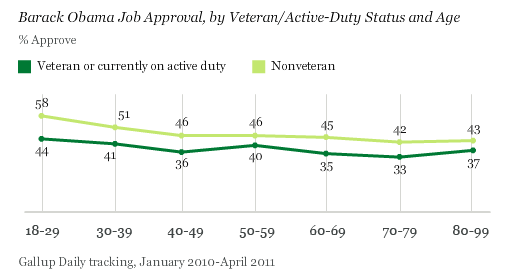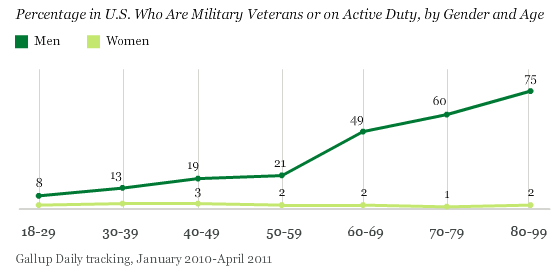The military is supposed to be apolitical, and serving officers generally take that seriously. As Admiral Mike Mullen, chairman of the Joint Chiefs of Staff, put it in an oft-quote 2008 article: “The U.S. military must remain apolitical at all times and in all ways. It is and must always be a neutral instrument of the state, no matter which party holds sway.” Unfortunately, as anyone who has ever shared drinks with military folk, they’re willing to share their views offstage. Especially if they’re veterans. The latest Gallup poll makes clear those who have worn the nation’s uniform are cooler to President Obama than the U.S. population as a whole by about 10 percentage points, a significant margin.
This has got to be troubling to a President who never served in uniform, but one who has been far more military-friendly than Bill Clinton, the last Democratic commander in chief. Not only did Clinton seek to avoid military service in the draft-era Vietnam War (Obama is too young), but he sought to let gays serve openly in uniform (Obama is too young on that score, as well, but he ultimately succeeded in ending “Don’t Ask, Don’t Tell” as the rest of the nation ceased being spooked by the prospect). Obama, aided by Defense Secretary Robert Gates, Mullen, and Army General David Petraeus, has deftly pulled out of Iraq — which most of the U.S. military seemed to support — and reinforced U.S. troops in Afghanistan, which most of them also seemed to support. So why is there a markedly lower level of support for Obama among the military and veterans than the nation as a whole?
Part of it is because of the constant GOP cry that the White House is cutting military spending, and the troop and veterans’ benefits that go along with it. Even if it’s not true; pay and VA benefits continue to climb, more so than inflation. The average troop is paid more in cash and benefits than 80% of his or her equally-educated, non-military cohort. And military spending continues to grow, although you’d never believe it based on some of the alarms being sounded on Capitol Hill.
Part of it is simply because Obama is a Democrat. In recent decades, absent a draft, an all-volunteer military has been drawn increasingly from rural and Sunbelt regions, where the GOP tends to dominate. Many serving are the sons and daughters of those who served a generation ago, which only concentrates their partisanship.
“For younger, post-draft-era veterans, individuals with certain regional, demographic, or psychographic backgrounds may be more likely to be Republican and more likely to join the military,” Gallup’s Frank Newport suggests. “For older veterans, their service in the military may have led them to a more Republican viewpoint on politics, either during their service or in later years.”
And part of it is because most veterans are men, and men tend to view Obama less favorably than women.
But there is good news for both Obama and Mullen in the latest Gallup survey. Here’s Obama’s:
…far fewer young people have served in the military than in previous generations, giving them less clout among their younger cohort. While that may be good for Obama, it’s not good for the country; we are developing a warrior caste that is not good for a democracy.
As for Mullen?
Although active-duty military personnel are less likely to approve of the job Obama is doing than are national adults overall, this group’s disapproval is only marginally higher than that of national adults. This is because active-duty military — particularly those under 40 — are significantly more likely to say they have no opinion about Obama’s job performance than is the case for all adults in the same age group.
There are several possible explanations for this finding. Those on active duty may in general be less involved in politics and current affairs and thus less likely to hold an opinion on Obama or other political matters. Or, it could be that members of the active-duty military are adhering to a general nonpartisan norm within the military culture, and are therefore less willing to express an opinion to a survey interviewer, regardless of what they may actually believe.
Mullen should be proud that his apolitical message appears to be sticking.




